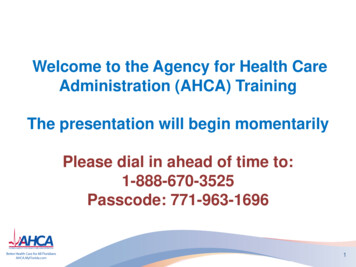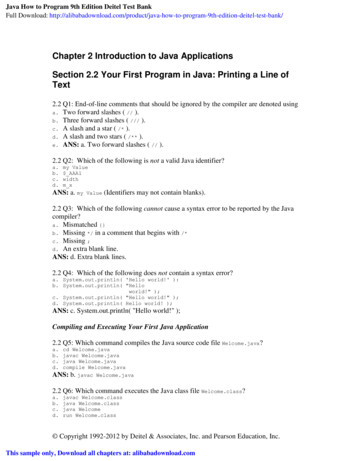
Transcription
Welcome to the Agency for Health CareAdministration (AHCA) TrainingThe presentation will begin momentarilyPlease dial in ahead of time to:1-888-670-3525Passcode: 771-963-16961
Guide forAssisted Living Facilities & AdultFamily Care Homes in theStatewide Medicaid Managed CareLong-term Care ProgramOctober 17, 20132
Today’s PresentationFollow the link below to theSMMC Website andselect the “News andEvents” tab under theheader image.Note: You can use the redbutton to sign up for SMMCProgram updates via e-mail.http://ahca.myflorida.com/smmc3
Today’s Presentation, cont.Select “Event and TrainingMaterials” to downloadtoday’s presentation.4
Today’s Presentation, cont.Choose the file(s) youwould like to save.Note: You may also viewfiles from past events andAHCA guidancestatements or submitquestions to be answeredin future presentations.5
Today’s Presenters Carol Schultz– Agency for Health Care Administration Eunice Medina– Department of Elder Affairs6
Presentation OutlineBasic Concepts A new long-term care (LTC) programHow to become part of an LTC plan’s providernetworkLTC program impact on Assisted Living Facilities(ALFs) & Adult Family Care Homes (AFCH)Protections for enrollees and providers duringtransition to LTC program7
A New Long-term CareProgram8
A New Long-term Care Program Florida Medicaid is implementing a newsystem for Medicaid enrollees to receive longterm care services. It is called the Statewide Medicaid ManagedCare Long-term Care Program (SMMC LTC).9
Who is Eligible?Individuals who fit into one of the following categories may beeligible for the LTC program: 65 years of age or older AND need nursing facility level ofcare (LOC)*OR 18 years of age or older AND are eligible for Medicaid byreason of a disability AND need nursing facility level ofcare.** Nursing facility level of care means that someone meets the medicaleligibility criteria for Institutional Care Programs (ICP), as defined inFlorida Statute.10
Programs Moving into LTCProgram Nursing facility residents currently receiving Medicaid-fundedfunded long-term care services. The following Medicaid programs will be combined into thethe new LTC program :– Assisted Living Waiver– Aged and Disabled Adult Waiver The Consumer-Directed Care Plus Program (CDC )– Channeling Waiver– Frail Elder Option– Nursing Home Diversion Waiver11
What Services are Covered?Adult companion careHospiceAdult day health careIntermittent and skilled nursingAssisted living servicesMedical equipment and suppliesAssistive care servicesMedication administrationAttendant careMedication managementBehavioral managementNursing facilityCare coordination/Case managementNutritional assessment/Risk reductionCaregiver trainingPersonal careHome accessibility adaptationPersonal emergency response system(PERS)Home-delivered mealsRespite careHomemakerTherapies, occupational, physical,respiratory, and speechTransportation, non-emergencyEach recipient will not receive all services listed. Recipients willwork with a case manager to determine the services they needbased on their condition.12
Current recipients of theseprograms will be enrolled in theLTC program without anyinterruption of services.13
Law Provisions The Statewide Medicaid Managed Care program willbe implemented statewide. The State has been divided into 11 regions thatcoincide with the existing Medicaid and Departmentof Elder Affairs areas.14
Long-term Care Plans by erigroupFlorida, HumanaMedicalPlan, Inc.MolinaHealthcareof Florida,Inc.SunshineStateHealth PlanUnitedHealthcareof Florida,Inc.XXXXXXXXXXXXXXXXXXXXXXXXXXX15
How to Become Part of anLTC Plan’s Provider Network16
When Should I Have aContract with an LTC Plan? You can contract with a plan at any time. HOWEVER, recipients begin choosing LTC plans twomonths prior to the “go live” date for their region. Choice counselors use a list of contracted providers tohelp recipients choose a LTC plan. To be on the list, you must have an executed contractand the contract must be verified by an automatedsystem.– Ask the LTC plan if your contract has been validatedin the Provider Network Verification (PNV) system.17
Enrollment vs. Registration To contract with the fee-for-service plan, aprovider must be actively enrolled inMedicaid. To contract with a capitated LTC plan, aprovider must be either actively enrolled inMedicaid or be registered with Medicaid.18
Provider Service Network ProviderEnrollment Providers who contract with the Provider ServiceNetwork (PSN) must be fully enrolled in FloridaMedicaid. Providers who are currently enrolled in Medicaidsimply share their Medicaid ID with the PSN. Providers who are not enrolled in Medicaid mustsubmit a Florida Medicaid Provider EnrollmentApplication.19
How to Enroll in Medicaid Go to http://portal.flmmis.com. Select Public Information for Providers, then select Enrollment. The link to the enrollment wizard is in the middle of the web page.20
ON-LINE ENROLLMENT WIZARD found at: 21
Capitated LTC Plan ProviderEnrollment Providers who contract with a capitated LTCplan must have a Florida Medicaid ID.– The LTC plan will use this ID to submit encounterclaims data. Providers who are already enrolled inMedicaid simply supply their Medicaid ID tothe LTC plan.22
How to Register with Medicaid Providers who do not have a Medicaid ID mayobtain one through a simplified registrationprocess. Registration is not the same as Medicaidenrollment. The LTC plan submits the registration for theprovider through:– Automated Mass Registration Tool; or– Simplified Registration Form23
How to Register with Medicaid(con’t.) The LTC plan signs the form and sends it toMedicaid.– Medicaid sends a welcome letter to theprovider.– The welcome letter contains the new MedicaidID and the LTC plan to which the provider islinked.24
How to Register with Medicaid(con’t.) The Managed Care Treating ProviderRegistration form is available on the ManagedCare page of the public Web portal at:http://portal.flmmis.com. The registration form may not be used to applyas a fee-for-service provider.25
How to Obtain the Registration Formhttp://portal.flmmis.com/FLPublic/Provider Enrollment/tabId/50/Default.aspx Go to providerEnrollment Then go to EnrollmentForms Click on Managed CareTreating Provider Click on Managed CareTreating ProviderRegistration Form26
27
Medicaid Fiscal Agent’s Web Portal All Florida Medicaid handbooks, fee schedules, forms, providernotices, and other important Medicaid information are available onthe Medicaid fiscal agent’s Web Portal at: http://portal.flmmis.com Also, the Florida Medicaid's Web Portal solution providescommunication, data exchange, and self-service tools to the providercommunity. The Web Portal consists of both public and secure areas (Web pagesrequiring a username and password). The public area contains general information, such as programawareness, notices, and forms.28
Already RegisteredIf the Assisted Living Facility (ALF) or the AdultFamily Care Home (AFCH) is already registeredwith MedicaidANDif the ALF or the AFCH needs to share the MedicaidID with a different managed care organization thanthe one that submitted the “Managed CareTreating Provider Registration” form,THEN the ALF or AFCH can directly contact thenew LTC plan to share their Medicaid ID.29
LTC Program Impact onALFs & AFCHs30
Participating AssistedLiving Facilities andAdult Family CareHomes must belicensed by theAgency for HealthCare Administration’sDivision of HealthQuality AssuranceHealth FacilityRegulation licensesunit and follow allFlorida Statutes andregulations.31
ALFsEligible to provideAssisted LivingServicesALFs will bill LTC plansfor service paymentsbased on terms ofcontract with the plan32
ALFsLTC plans must offer a contract to any ALF thatwas billing for Medicaid Waiver services as ofJuly 2012.After the first year of contract, LTC plans canexclude ALFs for not meeting quality orperformance standards.Please note that Assistive Care Servicesare rolled into Assisted Living Services.
AFCHsEligible to provide AssistiveCare ServicesAdult family care homesAFCHs will bill LTC plansfor service payments basedon terms of contract withthe plan34
Home-Like Environment All ALFs and AFCHs participating in the LTC program mustdemonstrate that they meet certain home-like characteristics tocontract with a LTC plan.– These are sometimes referred to as “home and community-basedcharacteristics.” The plans must include language in their ALF and AFCH contractsdetailing the requirement to offer a home-like environment. The LTC plans are responsible for reviewing the ALF or AFCH toensure it has met all the home-like environment characteristics.35
More Information on Home-LikeEnvironment Training presentations and Q&A can be found on the“Event and Training Materials” tab at:http://ahca.myflorida.com/SMMC36
Who Determines if the Recipient canContinue to Live at the ALF? As long as the facility can meet the resident’s needs and the ALF is in theLTC plan’s network, the resident can stay there. The LTC case manager will conduct a comprehensive assessment thatincludes the resident and participation by any other individuals chosen bythe resident to ensure the care plan provides for all necessary services andis tailored to meet the resident’s personal goals. After a resident has a face-to-face medical examination by a licensed healthcare provider and has been determined to meet admission criteria, the ALFadministrator is responsible for determining whether the facility can meetthe resident’s needs and for monitoring the continued appropriateness ofplacement of a resident in the facility. If it is determined that the facilitycannot, the administrator should contact the LTC plan.37
Who Determines Level of Care? Department of Elder Affairs ComprehensiveAssessment and Review for Long-Term Care Services(CARES) staff establish level of care for adultMedicaid enrollees. This process does not change in the new program. CARES performs an assessment to identify long-termcare needs; establish a level of care, and to recommendthe least restrictive, most appropriate placement.38
ALF’s RightsThe plan must ensure:– Provider relations and communication– Authorization processes including denials andappeals– Timely claims payment and assistance with claimsprocessing– Complaint resolution process39
Resident’s Rights Recipients enrolled in the LTC programresiding in an ALF or AFCH have the samerights currently in law, which includes theResident’s Bill of Rights. (Chapter 429,Florida Statutes) The recipient has the right to choose any ALFor AFCH in the LTC plan’s network.40
Enrollee Grievances The LTC plan must notify enrollees of how to pursue:– A complaint– A grievance– An appeal– A Medicaid Fair Hearing How to report abuse, neglect and exploitation41
Enrollee Grievances All Medicaid enrollees can file for a Fair Hearingthrough the Department of Children and Families.– The administrative hearing reviews an actiontaken by a LTC plan that limits, denies, or stopsa requested service.42
Protections forEnrollees and ProvidersDuring Transition to LTCProgram43
Transition Period LTC plans must continue enrollees’ currentservices for up to 60 days until a newassessment and care plan are completeand services are in place. LTC plans must complete a care plan withinfive days of enrollment for new enrollees inan assisted living facility or adult family carehome.44
How Will Providers Know Whetherto Continue Services?Continue to provideservices until you receiveinstructions from the LTCplan.45
Continuity of Care Until a new care plan is implemented, LTC plans must pay forservice delivery from an enrollee’s current provider, even ifthe provider does not have a contract with the LTC plan. During this transition period, the LTC plan must pay networkproviders the rate agreed to in their executed subcontracts, andmust pay non-network providers the rate they are currentlybeing paid. LTC plans may require providers to submit documentation ofthe current pay rate (e.g., current referral agreements,subcontracts, paid claims).46
Continuity of Care Providers should continue to provide services toeligible recipients until they receive instructions fromthe LTC plans. Providers must continue to check recipient eligibilityprior to rendering services, as is required now.47
How Much Notice Will Providers Getto Stop Providing Services? There are no requirements for LTC plansto give a certain amount of notice. Notice may be as little as one day.48
How Will Providers Get Paid? If you have a contract with the LTC plan, you will bepaid as specified in your contract. If you do not have a contract with the LTC plan:– You will be paid at the rate you are currently paid.– Be prepared to document your current rate.– You do not have to have a letter of agreementwith the LTC plan.49
How Long Will it Take to Get Paid? LTC plans must pay a clean claim:– Electronic: within 20 days– Paper: within 40 days The LTC plan must have a process forhandling and addressing the resolution ofprovider complaints concerning claimsissues.50
What if I Have TroubleGetting Paid? Call your local Medicaid area office. Contact numbers are areas The Agency will ensure you are paidappropriately and timely for services renderedaccording to a current care plan.51
Resources Questions can be emailed to:FLMedicaidManagedCare@ahca.myflorida.com Updates about the StatewideMedicaid Managed Care programare posted at:www.ahca.myflorida.com/SMMC Upcoming events and news can be foundon the “News and Events” tab. You may sign up for our mailing list byclicking the red “Sign Up for ProgramUpdates” box on the right hand side ofthe page.52
Additional AFloridaTwitter.com/AHCA FL53
Capitated LTC Plan Provider Enrollment Providers who contract with a capitated LTC plan must have a Florida Medicaid ID. -The LTC plan will use this ID to submit encounter claims data. Providers who are already enrolled in Medicaid simply supply their Medicaid ID to the LTC plan. 22











